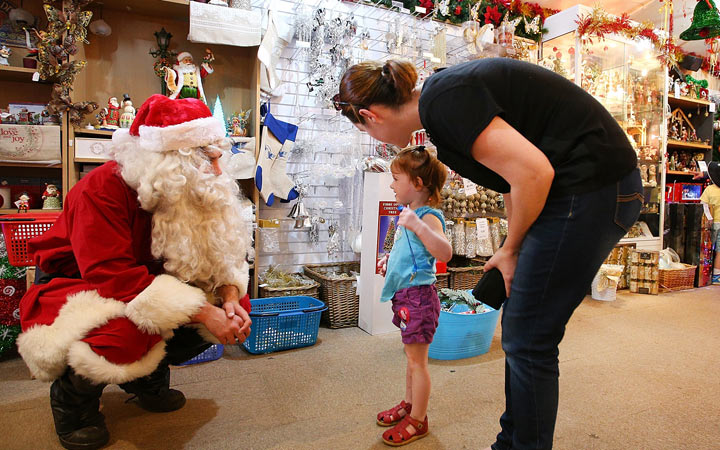TORONTO – Kris Kringle, jolly old Saint Nicholas, Father Christmas, even the Santa Clause.

In various forms, Santa Claus has played a starring role in Christmas celebrations for years.
A 2011 poll by The Associated Press found that 84 per cent of adults believed in Santa Claus as a child. Fifty-seven per cent of parents polled said that Santa plays an important role in their holiday celebrations.
But for many parents there comes a time when their child asks, “Is Santa real?” A child’s belief in Santa – and that question – can put parents in a precarious position.
Child psychologist and experts offer their advice on how to talk to your children about Santa Claus.
Why Santa?
Santa is a much-loved part of both religious and secular celebrations of Christmas.
“Santa Claus is more than someone who just comes and gives you a present, it’s this whole spirit of giving and magic that you get to be a part of and celebrate,” said Cyndy Scheibe, an associate professor at Ithaca College in New York.
Scheibe has been talking to kids about Santa since 1986. She said that many Jewish children say they believe in Santa even if he doesn’t visit their house on Christmas Eve.
“Many non-Christian parents embrace Santa because they see Christmas serving as a secular as well as religious holiday,” said Scheibe.
Some experts say that another reason children believe in Santa is because they are imaginative and love to pretend.
“And when children pretend, they are exercising the evolutionarily crucial human ability to envision alternative ways the world could be. In adults that ability is at the core of our very real capacities for invention and innovation,” said Alison Gopnik, a professor of psychology at the University of California at Berkeley.
Debating the Santa myth
Experts have debated the Santa myth for years. Some argue that perpetuating it discourages healthy skepticism in children and requires adults to carry on an elaborate lie.
Tom Flynn, executive director of The Council for Secular Humanism and author of The Trouble With Christmas, argues the Santa myth promotes lazy parenting and encourages materialism and fear in children.
“Exposing children to systematized, delusional ideas until they are ‘old enough’ might influence their psychological development in ways that are, as yet, unknown but possibly bad,” said psychologist Clifford N. Lazarus.
Lazarus argues that continuing the Santa myth also brings up questions of trust and betrayal between children and their parents. When a child doesn’t get the gift he or she asked Santa for, “this sad, ‘side-effect’ of the Santa myth can only be explained away by more deception from adults, or the dejected children will simply conclude that they just don’t deserve what they wanted the most,” he said.
“Maybe it’s time to announce once and for all ‘No, Virginia, there is no Santa Claus! But Christmas and all of the holidays and observances can still be a time of love, fun, faith, friendship, fellowship, gift giving, charity, and joy’.”
Others say the belief in Santa is harmless.
Gopnik argues that whether a child is playing make-believe without actually thinking Santa is real, or firmly believes in the existence of Santa Claus (thanks in large part to parents affirming those beliefs by eating cookies and milk while the kids sleep on Christmas Eve), neither scenario is truly harmful, as even most adults believe in the supernatural.
Dr. Matthew Lorber, a child psychiatrist at Lenox Hill Hospital in New York City, said imagination is a normal part of development.
“I don’t think it’s a bad thing for kids to believe in the myth of someone trying to make people happy if they’re behaving,” Lorber said.
How to talk to your kids about Santa
Many experts recommend taking your child’s age into consideration when discussing the existence of Santa. Many children will stop believing in the existence of Santa in time.
The 2011 AP poll found the average age when children stopped believing in Santa was just shy of 9 years old (8.8 years).
“The change in children’s conceptualization of Santa is driven in part by cognitive development: as level of reasoning increases, belief in Santa will decrease,” said Carole S. Slotterback, professor of psychology at the University of Scranton.
In 2008, Canadian researchers looked at data from two historical studies on children’s beliefs and Santa Claus.
They found that in both studies, most children eventually figure out the truth about Santa on their own, and parents reinforce that discovery.
“Children ask their parents, for example, how Santa gets in the house if there’s no chimney. Even if the parents say they leave the door unlocked, the child will figure out that Santa can’t be everywhere at the same time and that reindeer can’t be that fast,” said Serge Larivée, psychology of education professor at the University of Montreal.
If your child asks “Is Santa real?” Schiebe says to answer with “what do you think?” This may give you some insight into why your child is asking, and if they really are ready to know the answer.
Take cues from your children and ask yourself if you think they’re ready to learn the truth, recommends Glen Elliott, associate professor and the Director of the Department of Child and Adolescent Psychology at the University of California.
Elliott said there is no one right time to tell your kids the truth about Santa.
“The important thing is to take your cues from the child, and not try to prolong the fantasy for your own enjoyment when they may be ready to give it up,” he said.
When you think your child is ready to know the truth, tell them. Some experts recommend telling the story of Saint Nicholas as a historical figure and explaining how “Santa Claus” evolved into the mysterious, bearded giver of gifts we know today.


Comments